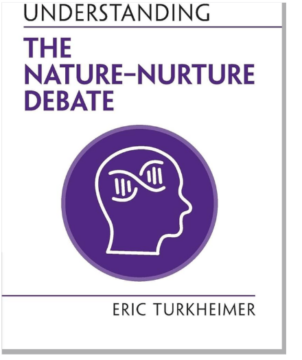Erik Parens at ELSI Hub:
 In his new book, Understanding the Nature-Nurture Debate, Eric Turkheimer sums up much of his thinking over his long and distinguished record as a behavioral geneticist. As a scientist, he has sought to understand what twin, adoption, and family studies can—and cannot—show regarding the role of genes in the emergence of human behavior. As a thinker, he has sought to understand what findings from those studies do—and do not—mean for us as individuals, who experience ourselves as having agency, and as citizens, who are acutely aware of the injustice and inequality that plague our society. And, as a colleague, Turkheimer has shown unstinting generosity to those of us in bioethics who want to understand what the science shows and what it means.
In his new book, Understanding the Nature-Nurture Debate, Eric Turkheimer sums up much of his thinking over his long and distinguished record as a behavioral geneticist. As a scientist, he has sought to understand what twin, adoption, and family studies can—and cannot—show regarding the role of genes in the emergence of human behavior. As a thinker, he has sought to understand what findings from those studies do—and do not—mean for us as individuals, who experience ourselves as having agency, and as citizens, who are acutely aware of the injustice and inequality that plague our society. And, as a colleague, Turkheimer has shown unstinting generosity to those of us in bioethics who want to understand what the science shows and what it means.
As the Human Genome Project took off in the 1990s and 2000s, Turkheimer had the insight and courage to stand nearly alone among his colleagues in criticizing what he took to be their unrealistic enthusiasm about how useful it would be—in terms of improving both behavioral and medical care—to sequence human genomes. He was among the first to recognize the way in which discoveries of single “genes for” rare disorders like cystic fibrosis were, essentially, red herrings in the hunt for causal pathways from genes to common disorders and other complex traits. Had Turkheimer’s skepticism about discovering causal pathways been taken more seriously, those charged with caring about the public’s health might have adjusted how much they invested in genomics.
But it isn’t such practical implications that preoccupy him in the new book. Rather, it is the ethical and social ones.
More here.
Enjoying the content on 3QD? Help keep us going by donating now.
